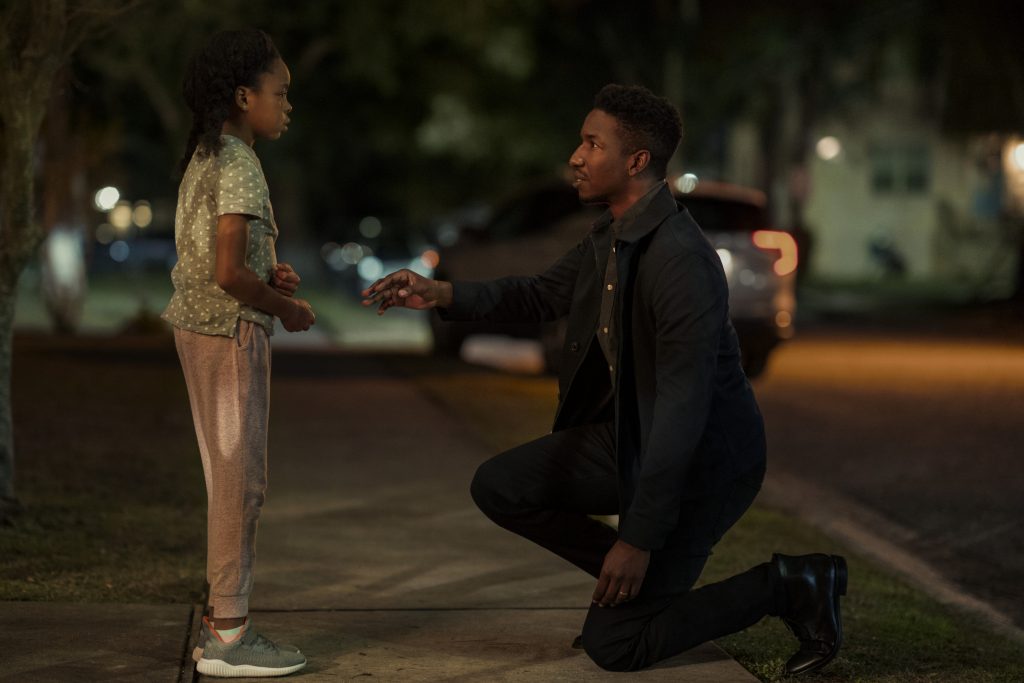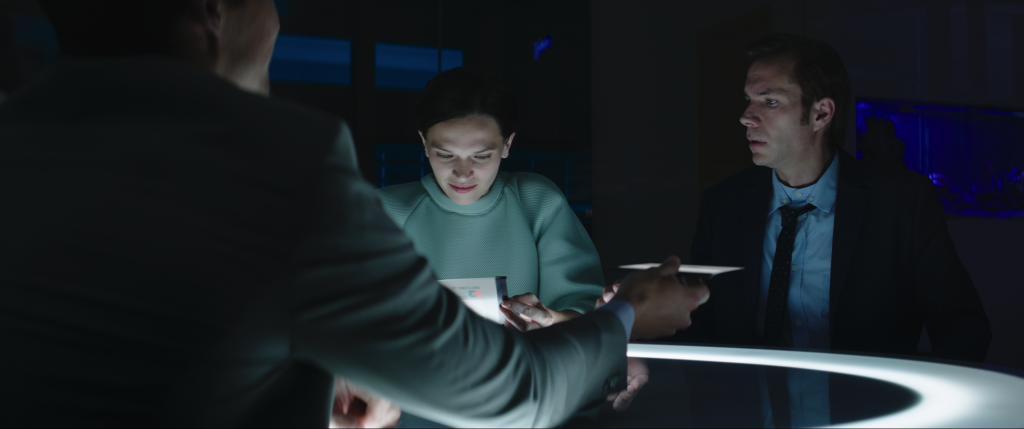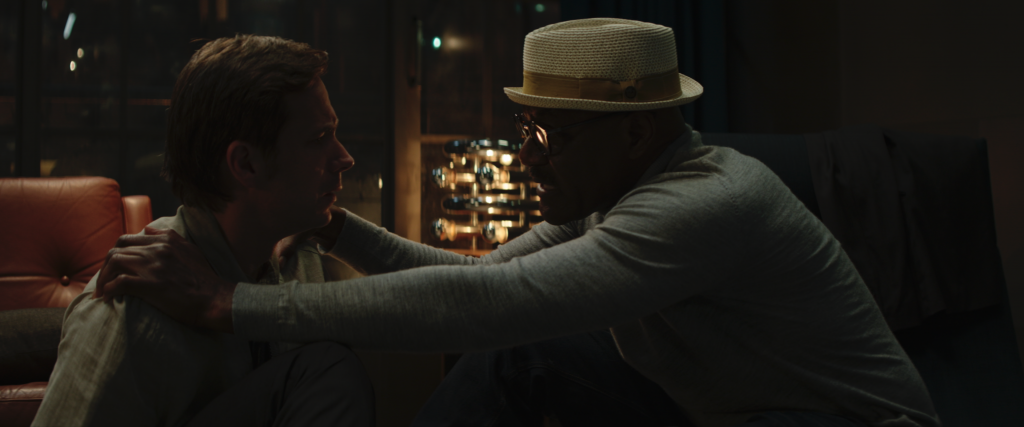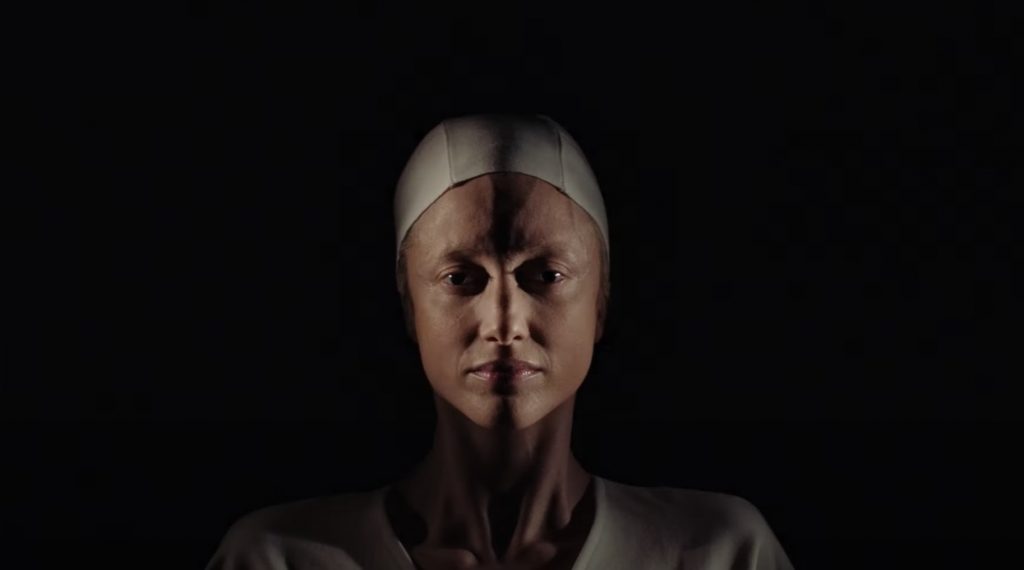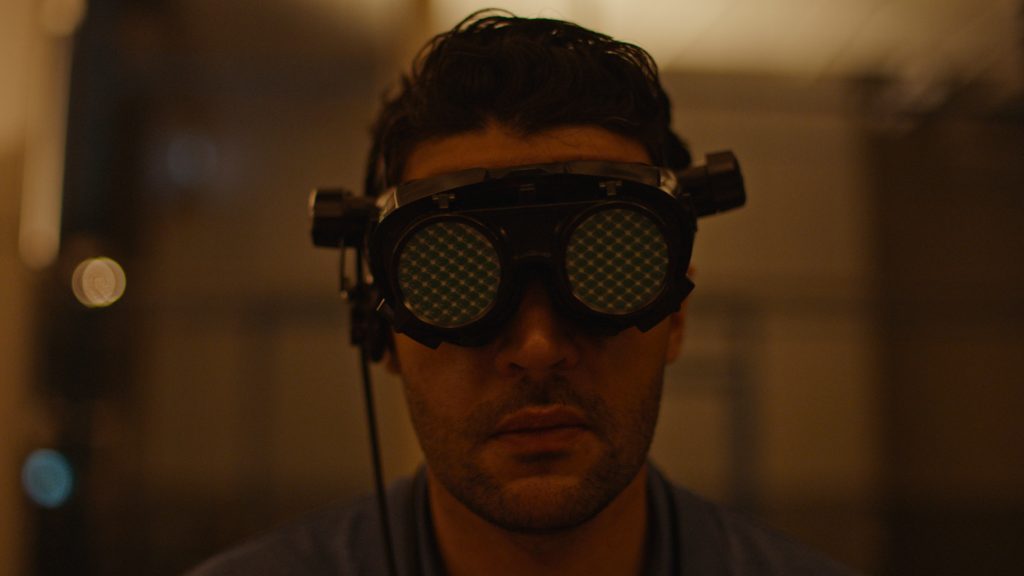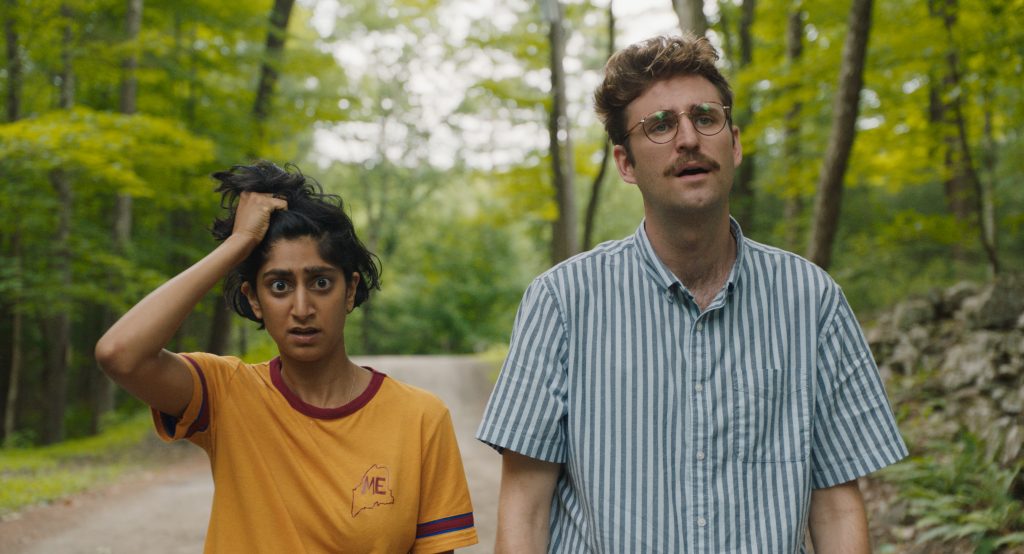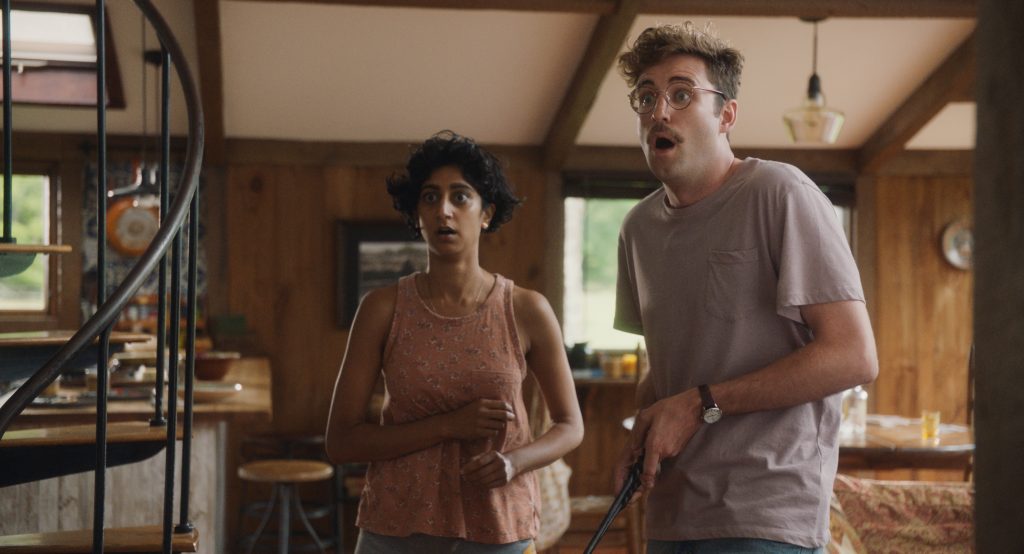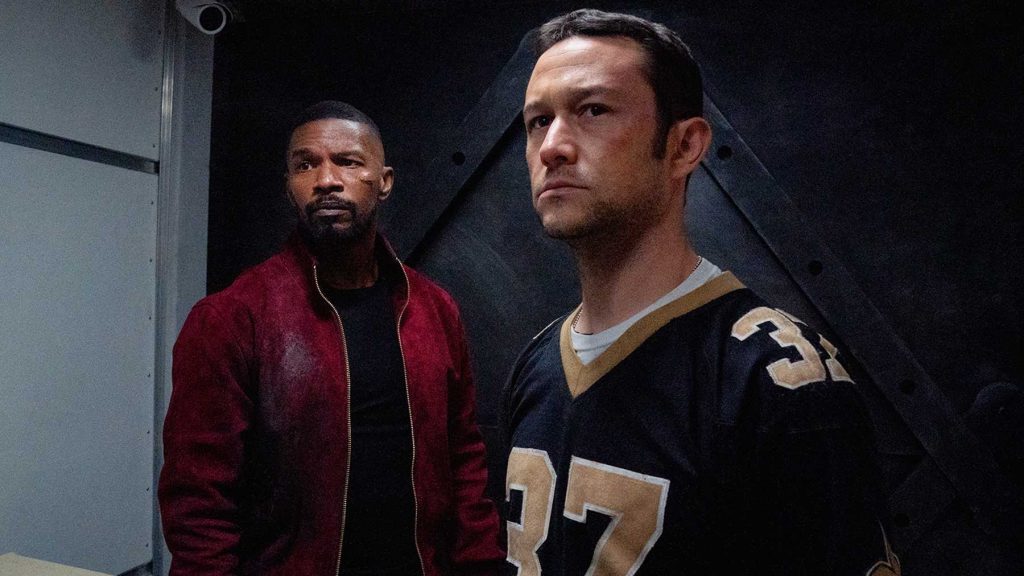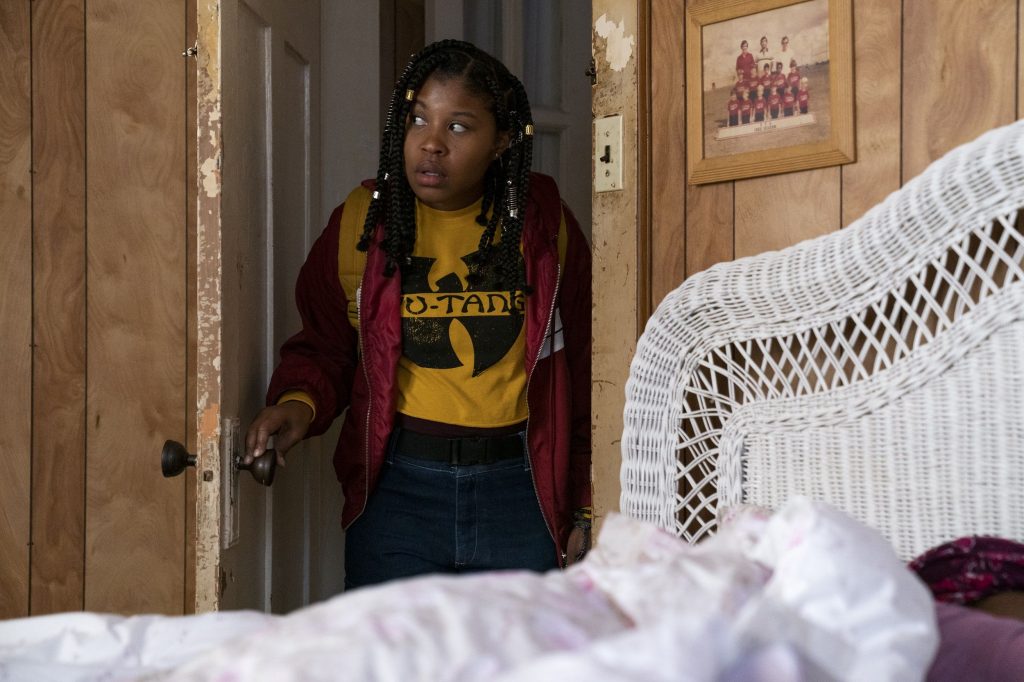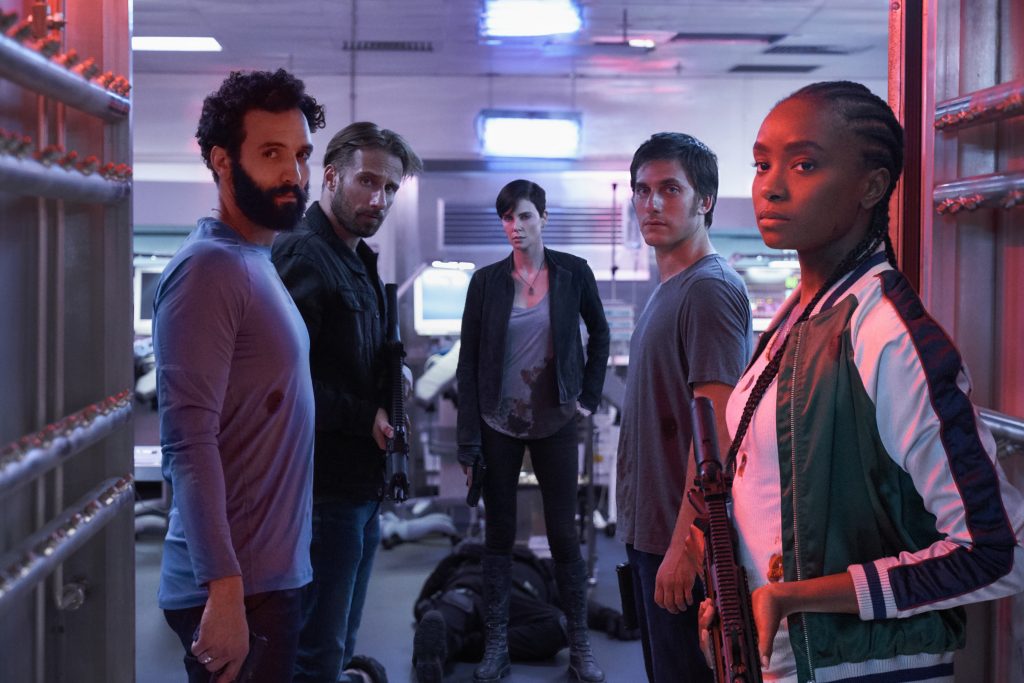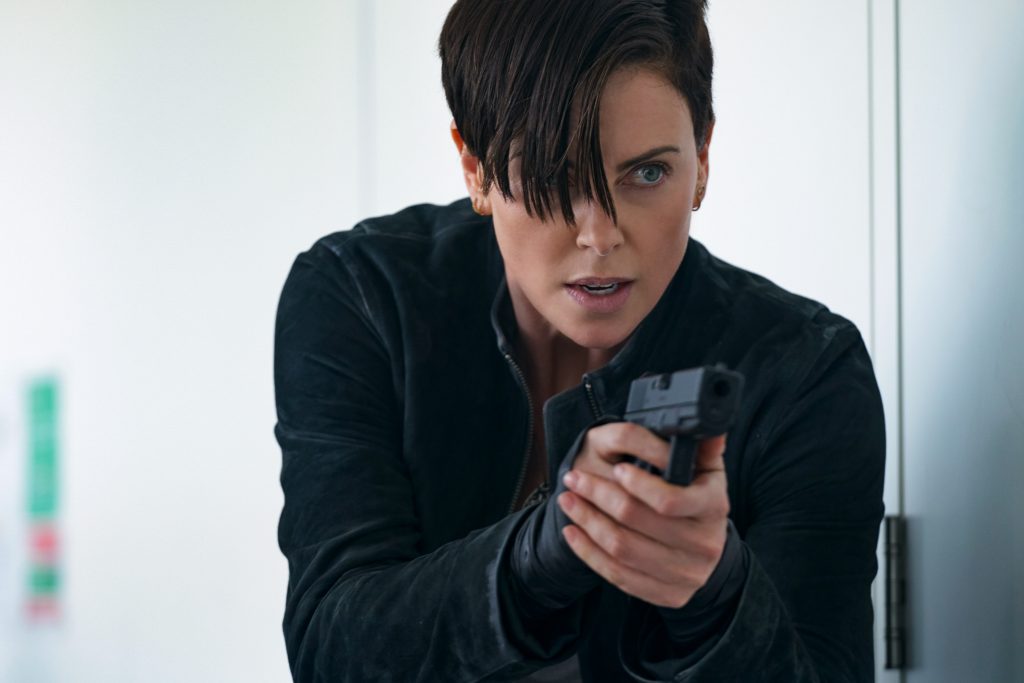October 16, 2020
by Carla Hay

Directed by Michael Matthews
Culture Representation: Taking place in California and other parts of the U.S., the sci-fi/horror/adventure film “Love and Monsters” has a predominantly white cast (with some Asians, Latinos and African Americans) portraying the middle-class.
Culture Clash: A 24-year-old man goes on a quest to reunite with his former high-school sweetheart during an apocalypse in which deadly mutant monsters have taken over the world.
Culture Audience: “Love and Monsters” will appeal to several generations of people who like sci-fi/horror movies that successfully blend other genres, such as comedy, action, romance and drama.

Even though “Love and Monsters” takes place in a post-apocalyptic world in which mutant monsters have killed off about 95% of the human population, the movie is not a grim and horrific slog that many people would expect it to be. In fact, “Love and Monsters” (directed by Michael Matthews) has a lot of charming comedy as well as heartfelt dramatic moments that can appeal to a wide variety of people. It’s the type of winning movie that people would want to see repeatedly and ask for a sequel. (And the end of the “Love and Monsters” definitely leaves open the possibility that there could be a continuation of the story.)
The central character of “Love and Monsters” is Joel Dawson (played by Dylan O’Brien), a 24-year-old “regular guy,” who lives in an underground bunker with several other young people who are under the age of 40. Apocalypse survivors who live together as a community call themselves a colony. According to Joel’s voiceover narration in the beginning of the movie, the apocalypse (which is called the Monsterpocalypse) happened when chemical compounds from bombs rained back down on Earth and caused animals to mutate into giant monsters.
The monsters killed most of the world’s human population within a year. The survivors fled underground, they live in colony bunkers, and go above ground in hunting parties to search for food. In addition to food that they find above ground, the members of Joel’s colony survive by growing their own food inside the bunker. They also have a cow for milk.
“Love and Monsters” takes place seven years after the Monsterpocalypse began. Joel is an orphan whose parents were killed right when the apocalypse started while the family was trying to escape the monsters that invaded their neighborhood. Joel (who is an only child) is originally from Fairfield, California, a city about 45 miles northeast of San Francisco. Like most apocalypse survivors, Joel doesn’t have any biological family members who are still alive.
Joel has found a new family with the colony of survivors who rescued him when the apocalypse began. However, Joel feels like somewhat of an outsider in the group. All of the other members of the colony have coupled up (and one couple has had a baby together), while Joel is the only one who doesn’t have a love partner. He also gets scared easily and freezes up when he sees monsters. Therefore, the colony doesn’t consider Joel to be useful for hunting trips and anything that would involve defending their colony from danger.
However, Joel is good at fixing things, he’s loves to draw, and he’s the colony’s main cook. One of the gadgets that Joel likes to tinker with is the bunker’s portable radio, which is the main way that colonies communicate with each other. (Television, phones and the Internet don’t exist in this world.)
Through a lot of investigating and persistence, Joel has found out that his first love, Aimee (played by Jessica Henwick), who was his girlfriend in high school, is living in a colony about 85 miles away in a place called Jenner Beach. He makes contact with Aimee, and she seems thrilled to hear from Joel. Over a period of time, they continue to talk to each other over the radio. And Joel finds himself falling in love with Aimee again.
When Joel and Aimee dated in high school (the movie has a few brief flashback scenes to this time period), their romance was interrupted because they were forced to flee separately with their respective families during the apocalypse. And then, Joel and Aimee lost touch with each other, until now. Because Joel feels like the “odd man out” in his colony, he’s starting to wonder if he really belongs there.
Joel’s colony has a close call when a monster invades the bunker and nearly kills Joel, who is rescued just in time by some other people in the colony who shoot the monster and kill it. This incident causes Joel’s self-esteem to take another hit because he believes that the other members of the colony think of him as a cowardly wimp. This near-death experience and his yearning to reunite with Aimee motivate Joel to say goodbye to his colony to go above ground and try to reunite with Aimee.
The members of Joel’s colony are disappointed to see him go and they’re very skeptical that Joel will be able to survive this trip on his own. But Joel is determined to go. All they can do is wish him well. One of the members of the colony gives him a map, while Joel takes some other items on the trip, including weapons and a portable radio that hasn’t worked in a long time.
Joel’s trip isn’t always dangerous, but it has a lot of close calls with a variety of giant mutant animals. One of the first that he encounters is a giant frog in someone’s abandoned backyard. Joel is rescued from the giant frog by an intelligent and expressive Australian Kelpie, which Joel calls Boy. This stray dog becomes Joel’s constant companion throughout most of the movie. And the scenes with Joel and Boy are among the best in “Love and Monsters.”
At another point in the movie, Joel accidentally falls into a pit that’s the nest of a creature called a sandgobbler. This time, he’s rescued by two humans: a middle-aged macho man named Clyde (played by Michael Rooker) and a sassy 8-year-old girl named Minnow (played by Ariana Greenblatt), who are not related to each other but are traveling together because their family members have died.
Minnow initially teases Joel over his tendency to get frightened easily, but Minnow eventually learns to respect Joel when he improves his target and defense skills. Clyde and Minnow are traveling north to a destination called Snow Mountain Wilderness, which has a colony of survivors who say the location is safer than other places because the cold and elevation keep the monsters away. The camaraderie between these three seemingly unlikely travel companions is also one of the highlights of “Love and Monsters.”
Clyde and Minnow invite Joel to go to Snow Mountain Wilderness with them. And when all three of the travelers reach the literal crossroads where Joel has to decide to go with Clyde and Minnow or continue west to reunite with Aimee, it’s easy to know what decision he will make. The rest of the movie takes a few twists and turns that refreshingly avoid a lot of predictable scenarios.
The visual effects for “Love and Monsters” are above-average, but they’re not going to win any major awards. The movie’s world building and how these creatures look are a commentary on the hazardous and deadly effects of humans who don’t take care of the environment. And the environment gets revenge on the humans in this apocalyptic way. The deadly mutant creatures include giant snails and what’s considered the most fearsome and worst mutant monster of them all: the Queen Sandgobbler, which looks like a giant mutant crab.
But not all of the monsters are deadly. Some of the giant creatures just want to be free to live without being hunted, and there’s a message in the movie about how monsters can be judged by looking at their eyes. It sounds a lot cornier than how it’s handled in the movie. One type of harmless creature is the sky jellyfish, which appear in one of the most touching and visually compelling scenes in the movie.
O’Brien, who was the star of “The Maze Runner” movie series, takes on a very different type of post-apocalyptic world in “Love and Monsters,” where humans are more likely to be helpful to each other, rather than have their lives revolve around the cutthroat and cruel competitions that are the basis of “The Maze Runner.” That doesn’t mean all is harmonious among people in the world of “Love and Monsters.” Someone can be expelled from a colony for stealing food, which is considered one of the worst crimes to commit in the “Love and Monsters” world.
The “Love and Monsters” screenplay was written by Brian Duffield and Matthew Robinson, who successfully mix various genres in the story. Most of the humor comes from Joel’s self-admitted awkwardness and insecurities, which many viewers will ultimately find endearing because he remains a humble person who’s a romantic at heart. Duffield also wrote and directed the critically acclaimed 2020 film “Spontaneous,” another Paramount Pictures movie about a young romance during a plague, although “Spontaneous” has a darker edge that’s geared to mature audiences. Thanks to assured direction, a genre-blending original story, and an appealing cast of characters, “Love and Monsters” is a crowd-pleaser that invites people into a world that’s very perilous to live in, but it’s a world that viewers will want to revisit and see what happens next.
Paramount Pictures released “Love and Monsters” in select U.S. cinemas, digital and VOD on October 16, 2020.


